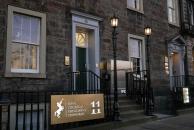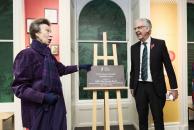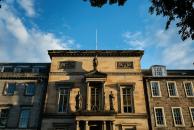

College to launch new exhibition on 'Skin: A Layered History.'
01 February 2023
The Royal College of Physicians Edinburgh (“the College”) will next week launch a new free public exhibition exploring skin, disease and treatment over 600 years of history – and it includes interviews with practising dermatologists.
Interviews with Dr Ophelia Dadzie, consultant dermatologist and founder of London Ethnic Skin will also be available to hear as part of the exhibition.
Modern artwork by Eliza Bennett will also be featured, whose work ‘A woman’s work is never done’ uses stitches in her hand to recreate a worn and hard-worked palm. Sculptures by Edinburgh-based artist Jessica Harrison from her series ‘Handheld’ will also be on display - a fascinating collection of miniature furniture made from skin-alike material, which explores the relationship between the exterior and the interior of the body.
The books, objects and illustrations on display highlight the complex connections between people and their skin throughout history. These include never before exhibited wax moulages dating from the early 1900s of patients at the Royal Infirmary of Edinburgh. The exhibition will give an insight into 600 years of pioneering Scottish treatment of skin disease.
Dr Ophelia Dadzie said:
For me, dermatology is a branch of medicine that involves the study of skin and its diseases but also its appendages so hair, nails and mucus membranes. Dermatology as a practice developed in western Europe so we have come from a history of Eurocentrism. In terms of language, the way we describe skin diseases and that’s because of how it was developed: practising on people with more lightly pigmented skin. Grading skin diseases is often through types of erythema (redness). How do you tally the difference between what you’ve been taught and what you face on a daily basis? I think that is problematic.
Dr Daisy Cunynghame, Curator of ‘Skin: A Layered History’, said:
The skin has always been central to how people perceive themselves and others. It’s a complex web of touch, colour and texture and this exhibition aims to highlight previous misconceptions as well as historic developments. Through artworks, objects, recipes and treatises we explored skin conditions from acne to leprosy and treatments from beetles to razors. People’s experiences are key to history. ‘Skin: A Layered History’ aims to place these at the centre. We consulted with specialist physicians and interviewed dermatologists to ensure that the exhibition was as layered and nuanced as the skin itself.
Dr Ophelia Dadzie added:
Even in terms of how we assess the impact on a person is biased. If your grading scale is based on erythema (redness) it doesn’t properly reflect how a disease impacts a person’s quality of life. If you have darkly pigmented skin, you’re not going to have redness being appreciated. It’s in the images and language we use and dermatology is steeped in that but it is changing. It is changing.







